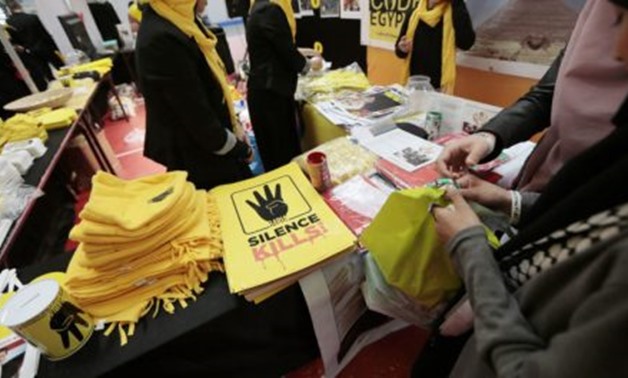
A pro-Muslim Brotherhood stand at a conference organized by the Union of Islamic Organisations of France- AFP
CAIRO – 11 September 2017: Several European governments have reconsidered their policies towards the Muslim Brotherhood group which has been outlawed by many Arab and European governments after the Egyptians have protested against the Brotherhood’s ousted President Mohamed Morsi rule in June 2013.
On September 11, the Austrian Foreign Ministry and intelligence establishment have released a report on the 16th anniversary of the 9/11 attacks. The 60-page report documents exploitation of the Austrian government’s funds and schools, radicalization of local Muslim communities, and the use of Austrian territory as a springboard for Brotherhood activism in Arab countries.
“The Brotherhood group selectively used violence and sometimes terror in pursuit of their institutional goals,” the report warned against its habit of political double-talk, and advised the British government to be wary of engaging Brotherhood affiliates as partners.
In 2014, the British government ordered a review of the movement, its presence in the UK, and the question of how official policy should treat it. The process did not culminate, as some critics of the Brotherhood had hoped, with the designation of the group as a terrorist organization.
Last March, the Swedish government’s Civil Contingencies Agency published a controversial report on the Brotherhood which found that the movement was creating a “parallel society” in the country, at odds with Swedish values.
The larger concern which these and other reports have raised is that the Brotherhood has for too long been not just tolerated but also legitimized and empowered in Europe.
Brotherhood members have come to dominate some of the largest mosques and Islamic schools, organized the resettling of refugees, and trained young imams to preach in local languages in Europe.
Last June, the French government closed many Salafist mosques in Paris, including the Grand Mosque of Paris, located in the fifth zone. “The Grand Mosque was reopened again after the French Interior Ministry proved the mosque’s imams are moderate,” French sources told Egypt Today.
Yussuf Nada, one of the most influential Brotherhood diaspora activists, nearly 50 years ago settled in the Austrian town of Graz. Since then, influential members of the Egyptian, Syrian and Palestinian branches of the Brotherhood have settled in Austria as well, where they lived unimpeded and enjoyed a comfortable base of operation.
In countries such as the UK where steps against the Brotherhood have been taken, Brotherhood affiliates and their allies have been pushing back fiercely. But this week’s new report in Austria provides a further indication that the tide may be turning against the movement on the whole continent.


Comments
Leave a Comment